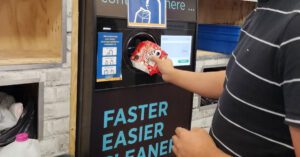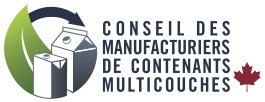Winter 2023 Newsletter
Volume 10, Issue 2
Ontario consults, Québec accelerates, New Brunswick prepares and B.C. succeeds: Canada’s deposit return systems continue to evolve

B.C.’s ReturnIt employs reverse vending machines at some of its depots to collect beverage containers, including milk cartons.
Many of Canada’s provincial and territorial deposit return systems (DRS) for beverage containers—most of which already incorporate cartons to some degree—have experienced noteworthy developments in the past year. We published a first overview of some of these systems in November 2022, and offer now below a quick update on their evolution with a focus on cartons.
Ontario
Ontario’s DRS presently only covers containers for alcoholic beverages, which include wine cartons. Non-alcoholic beverage containers have been collected for years through the curbside system. This approach was expected to continue under the province’s new full producer-led Blue Box program whose deployment began this summer, with the planned addition of a new out-of-home component. But in late June, the provincial government decided instead to consider the creation of a parallel DRS for non-alcoholic beverages and launched a consultation process with representatives of the beverage and waste management industries. The working group and three subcommittees that were formed are scheduled to deliver their recommendations to the Minister of the Environment, Conservation and Parks this coming February. We’ll have a better idea at that time of potential impacts on cartons.
Québec
The first phase of the modernization of Québec’s producer-led DRS, which will increase coverage to all beverage containers of 100 ml to 2 l, commenced on November 1 in accordance with the amended implementation timeline released by the government in August. Aluminum beverage containers that were not yet part of the province’s longstanding system (like some cider, juice and sparkling water cans) have now been incorporated. For uniformity’s sake, the deposit amount has simultaneously been set at 10 cents for all containers except for certain glass bottles whose deposit has been put at 25 cents (for more information, visit the Consignaction website). The addition of beverage cartons to the system, originally scheduled to occur separately on November 1, 2025, was accelerated by six months to coincide with the introduction of all remaining plastic and glass containers on March 1, 2025. From a logistics and communications perspective, the combination of these steps appears to make sense.
New Brunswick
New Brunswick’s migration of its DRS to a full extended producer responsibility model is scheduled to take effect on April 1, 2024. In preparation, Encorp Atlantic, the agent which managed the recycling of deposit-bearing containers for non-alcoholic beverage producers in the province for more than 30 years as a for-profit entity, changed its structure to a non-profit producer responsibility organization (PRO) this past spring. As the now official PRO, Encorp submitted in August a 5-year stewardship plan for the collection and management of all types of deposit-bearing beverage containers (including alcoholic beverages, non-alcoholic beverages and refillable beer) which is currently under review by the government’s Recycle NB. This plan will be available to be consulted by stakeholders once approved. A container recycling fee (CRF) similar to those in place in British Columbia, Alberta and Saskatchewan is expected to be instituted to finance the system. The current half-back mechanism under which customers receive half their deposit when returning containers, with a portion of the remainder used to finance the system, will come to an end. Under the revised system, New Brunswickers will get their full deposit back. The CRF amount should be announced by December. We’ll be better able to tell the impact of the changes on cartons once the stewardship plan is made public.
British Columbia
British Columbia’s DRS, known as ReturnIt, has been operating under an EPR model for many years now. One recent change of note concerning cartons was the expansion of the program in February of last year to all milk and plant-based beverage containers. The success of this move was immediate. As reported in its latest annual report, ReturnIt already recovered and recycled in the first year approximately 60% of all milk containers sold in B.C. (cartons and other types of containers combined).
Contents
- Ontario consults, Québec accelerates, New Brunswick prepares and B.C. succeeds: Canada’s deposit return systems continue to evolve
- More Accurate Carton Recycling Rates in Ontario Revealed
- MRF Profiles: York Region, Greater Sudbury, Southeast Eco360 (Moncton)
- EcoSchools Update
- CCC Announces Recipients of 2023 Community Education Award Grants in Atlantic Canada

